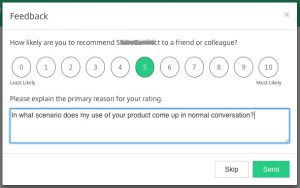Survey Reality Check
What are you asking in your customer service survey?
They say the NFL is a copycat league. Fashion is a copycat culture. Even businesses tend to copy what other successful companies do. So maybe it’s just human nature. Such is the way with customer surveys. There seems to be only two things on marketers’ minds these days:
- “How likely are you to recommend us?” and
- “How likely are you to refer us to a friend (or associate)?”
These are good questions. But why is everyone asking that same question?
Are You on the Right Track?
A marketing guru friend of mine said that ‘willingness to refer’ is the most meaningful question in market research because it captures how a customer really feels about the product, brand or company. He compared it to the political question “Do you think the country is on the right track?” That’s a good question because it reflects how the respondent feels overall about the country without getting into the weeds. It’s like an amalgamation of all the different variables into one overall view. The “refer” question is supposed to do the same thing. If you are willing to refer a company or product, it means you have an overall very high trust and probably a great experience with the company or product.
My guru friend told me that about a dozen years ago. I guess his wisdom spread, because now it seems to be the only question marketers can ask.
“Everybody Gives Me a Ten”
I recently purchased a new smartphone and had to return to the store to get a few questions answered. In between these two visits, I received a survey. I decided to take the survey because the young man who helped me was excellent. For working at one of the big, bad cell carrier corporate stores, he was surprisingly helpful (yes, surprisingly… the cell store is just short of the DMV when it comes to long waits and poor service). I wanted to take the survey specifically to give good marks to the young man who did such a great job for me.
The survey started with the question: “How likely are you to refer (company)?” I answered zero. I am not likely to refer the company. There are several reasons:
- Although Andrew was very helpful, I’ve had enough less than satisfying experiences with the company that I wouldn’t endorse them to a friend or associate.
- I only refer companies that I KNOW are reliable and trustworthy all the time. I don’t have that confidence with the cell company.
I went on in the survey to respond positively about the experience and the salesperson. In fact, I took the time to explain that the salesperson did a great job, but I wasn’t willing to refer because of past bad experiences.
When I went to the store the second time, I asked if the same person was there who helped me the first visit. He was. He helped me, and I told him I took the survey.
He responded, “Yeah, my boss called me in to review it. It’s the first time I haven’t gotten a 10 on the likely to refer.”
He went on to say that the other comments I made about his service were appreciated and his boss was okay with it. However, the “willingness to refer” question is the one that the company uses in evaluating the associates. And I was the first person who didn’t give him a 10.
The lesson: that question is useless (no one should get a ’10’ on every survey…no one), it isn’t actionable data.
Why Not Ask Things That Matter to Customers?
You as a marketer may want to know the overall feeling of the customer and be tempted to ask the “refer” question. Microsoft did when Powerpoint asked me in a pop-up “How likely are you to recommend Powerpoint to a friend or colleague?” Really? I answered “1 – not likely at all.”
In what circumstances am I going to recommend Powerpoint? What question is a friend going to ask that makes me think “You know what, I should recommend Powerpoint!” Who doesn’t know about Powerpoint? Does my answering this question really give Microsoft data that helps them better understand how to serve their customers?
How about asking “What is one suggestion that would make your use of Powerpoint better/easier/more complete?” OR “What is the most frustrating thing about Powerpoint that we could improve?” Those (or countless other) questions could inform a product improvement.
Don’t Copycat… Find Out What Your Customers Really Think
Market research and customer satisfaction surveys can yield excellent data. Ask questions that matter… don’t just copy what others do. Look at what competitors or market leaders are doing, but think about what really matters to your customers. If you only had one question to ask a customer, would it really be “How likely are you to refer us?”
Consider a question about better functionality. Or a question that asks for a complaint. Maybe a question that asks if they’d buy again from your company. The question for your company should be your own. Don’t copycat.
Thank you for reading this blog… How likely are you to recommend it? 🙂
If you’d like to discuss your market research plans, contact us.



